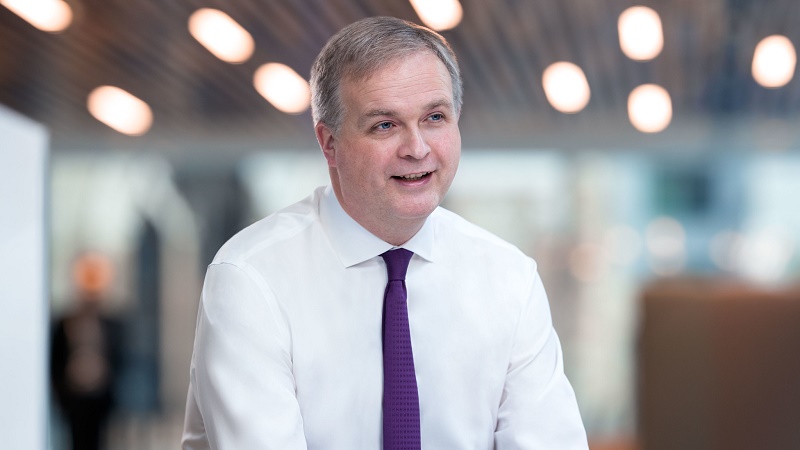According to the financial information service provider’s UK Dividend Outlook publication, ordinary dividend payments from FTSE 350 companies are expected to rise 4.7% this financial year, and banks are likely to be one of the biggest gainers.
Markit writes: “The banks are benefiting from improvements in asset quality, reporting better ratios on higher capital requirements and seeing improving profitability as a result of lower impairments.”
On average the group expects 8% growth in declared pay outs from UK banks, including a return to the dividend lists by Lloyds, albeit at a modest level of 1.67p (gross) for its final dividend, but it is HSBC that is expected to be the strongest performer on the dividend metric.
HSBC
According to Markit, while the bank disappointed market participants by maintaining its Q1 to Q3 payments in 2014, it expects the bank to grow its final dividend by 21%.
Stephen Message, manager of the Old Mutual UK Equity Income Fund, told Portfolio Adviser recently, that he likes financial services at the moment, including both HSBC and Lloyds.
"HSBC's dividend yield is approximately 5%, but we think it could see dividend growth in the mid to high single digits over the next year. It has a surplus of deposits sitting on its balance sheet and so is well placed to take advantage of the upturn in economic activity."
Patrick Barton, manager of the WDB Oriel UK Fund is also a holder of HSBC.
“We have been thinking a lot about how a return to a rising interest rate environment will affect the fund and how best to position it. In a rising rate scenario, late cycle cyclicals have tended to perform well, which are not the types of stocks we tend to look at,” he said.
Adding: “Classically, in a rising rate environment, you wouldn’t be looking at banks because a rising rate environment usually means tapering growth and the beginning of a rise in bad debts. But, given where we are starting from, that isn’t necessarily the case.”
According to Barton there are certain banks whose earnings have been artificially lowered by the abnormally low interest rate environment. And, once rates start to rise, those banks with strong balance sheets and an excess of deposits over loans could see earnings grow, especially because non-performing loans are likely to be lower than they have been.
Neil Woodford is on record as saying he likes HSBC, saying recently that he had taken a stake in HSBC for the first time since 2003 for his St James's Place segregated mandate, but there was a noticeable lack of financial services firms in his new fund's top ten holdings made public yesterday.
Lloyds
The views on Lloyds are a little less uniform, perhaps an indication of some of the challenges it has been through over the last few years.
Message is a holder of the bank and says one of the primary reasons is its expected return to the dividend lists.
"Lloyds is much more geared to the fortunes of the UK economy because of its share of the mortgage market. Going forward we believe its dividend capacity is pretty strong and we are expecting it to return to the dividend register next year. When it does it is going to pop back up on the radar screens of a number of income managers and we wanted to be there before that happened.”
According to Markit the bank’s performance in the first quarter of 2014, which saw it grow underlying profits by 22% and lower its impairment charge 57% gives it confidence that the bank could see “a quick increase in the payout in the medium term.”
Barton, however, is less convinced about Lloyds, explaining that, while he looked closely at it recently, he chose instead to look further afield and invest in Wells Fargo, the US commercial bank – a stock he has held for some time in the group’s international fund.
"It is certainly heading in the right direction but it is rather fully priced for us and, there may still be a few unexploded bombs in it, nothing dramatic, but there nonetheless."
Wells Fargo, on the other hand, he says is an extremely well run company with a great US franchise. "We think that it should see a strong earnings kicker when rates start to rise.
It is also not just Lloyds and HSBC that could do well once rates start to rise once more. Message is also positive on the broader financial services space, he currently likes L&G and Aviva, explaining that while Aviva investors have seen some strong share price performance over the past year they have, in the past had to live through some dividend cuts.
But, he says, the new management is doing a much better job of getting capital out of the subsidiaries. And, is scope for sustainable dividend growth in the future should the management team be successful in executing their strategy.
He adds that there are other financial services companies that are currently struggling because volatility is pretty low. Companies like IG Group and iCAp, which could see much better performances if volatility returns to more normal levels.











